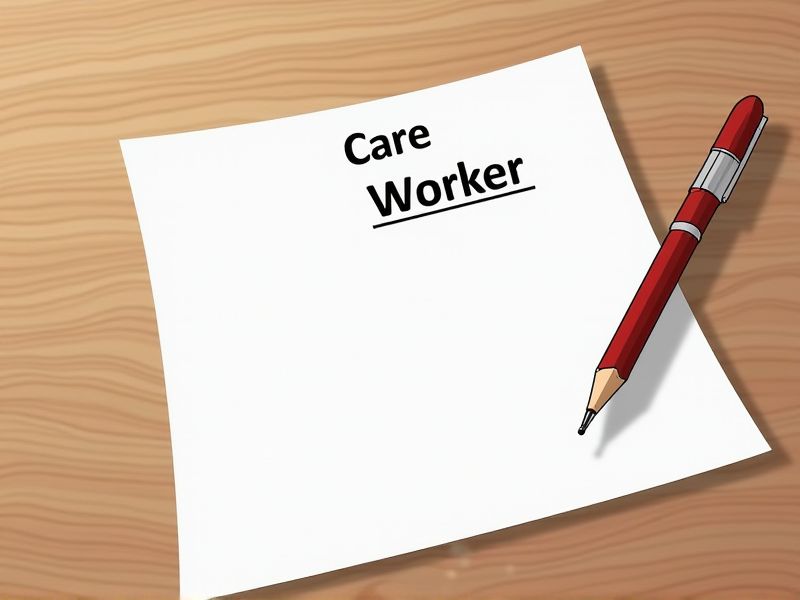
Care workers engage closely with vulnerable populations, necessitating a strong foundation in safety protocols to prevent harm and ensure optimal care. Certifications in areas such as first aid and safeguarding train workers to address emergencies and protect individuals' wellbeing. Industry-specific qualifications lend credibility and demonstrate a commitment to professional standards, which can impact job performance and client trust. Below are some important certifications a care worker may need.
Certified Nursing Assistant (CNA)
Healthcare environments experience high demand for personalized patient care, leading to the essential role of Certified Nursing Assistants (CNAs). CNAs provide fundamental support such as bathing, feeding, and mobility assistance, which contributes to patient comfort and recovery. Their presence allows nurses and doctors to dedicate more time to critical medical tasks, improving overall healthcare efficiency. A growing elderly population intensifies caregiving needs, further highlighting the vital role CNAs play in ensuring quality patient care.
Home Health Aide (HHA)
The number of elderly individuals requiring assistance with daily activities has increased, prompting the need for Home Health Aides as essential support for care workers. Complex medical conditions in home settings often require specialized attention, which HHAs provide, reducing the workload for primary caregivers. HHAs play a critical role in ensuring continuity of care by assisting with medication management and monitoring vital signs. Emotional support provided by HHAs fosters a comforting environment, aiding in the overall well-being of patients.
CPR and First Aid Certification
Increased survival rates are often linked to care workers' CPR skills as timely intervention can preserve brain function until advanced help arrives. Injuries and accidents are common scenarios in caregiving environments, and first aid certification equips workers to manage immediate health crises. Knowledge gained from such certifications also minimizes risks associated with complications during emergency situations. Regulatory standards often mandate these certifications, ensuring a baseline of care and safety for vulnerable populations.
Basic Life Support (BLS) Certification
Basic Life Support (BLS) certification equips care workers with essential skills to manage life-threatening emergencies, bolstering patient safety. This certification ensures that care workers can perform CPR and use automated external defibrillators effectively. It increases the chance of survival for patients experiencing cardiac arrest or respiratory distress. BLS training enhances a care worker's confidence and competence in handling critical situations.
Medication Administration Certification
Medication Administration Certification for care workers ensures adherence to safety standards, which reduces medication errors and enhances patient safety. It equips care workers with the necessary skills to correctly administer medications, thereby improving patient outcomes. Certification also reinforces adherence to legal and regulatory requirements, which protects both care workers and healthcare facilities from legal liabilities. Certified care workers are perceived as more competent and reliable, which can lead to enhanced job opportunities and career advancement in the healthcare sector.
Dementia Care Certification
Dementia care certification equips care workers with specialized knowledge to better understand and respond to the complex needs of individuals with dementia, leading to improved patient outcomes. Certification often increases caregiver confidence, reducing stress and burnout, which improves workforce retention and job satisfaction. Validated training ensures adherence to best practices, enhancing the quality of care provided and reducing the risk of harm or neglect. Earning a dementia care certification also elevates the professional standards within the field, promoting credibility and trust with families and healthcare providers.
Mental Health First Aid Certification
Care workers often encounter clients experiencing mental health challenges, and Mental Health First Aid Certification equips them with the skills to respond effectively. This certification fosters a safer environment by enabling workers to recognize early signs of mental distress. Workers with this certification can provide reassurance and guide clients to appropriate professional resources. Acquiring these skills reduces stigma and enhances the overall quality of care provided.
Infection Control Certification
Infection Control Certification ensures care workers possess the knowledge to prevent the spread of infectious diseases, enhancing patient safety. It reduces healthcare-associated infections, minimizing risks for both patients and healthcare professionals. This certification equips workers with updated protocols and best practices, aligned with global health standards. With certified knowledge, care facilities maintain compliance with regulatory guidelines, ensuring operational integrity and trust.
Elderly Caregiver Certification
Elderly Caregiver Certification standardizes quality of care by ensuring caregivers possess necessary skills and knowledge. Certification increases trust from families and care facilities, leading to more job opportunities for certified individuals. It helps in understanding and managing age-related health challenges, reducing risk of harm to elderly patients. Certified caregivers tend to exhibit higher levels of professionalism, reflecting positively on the quality of care provided.
Pediatric First Aid Certification
Pediatric First Aid Certification equips care workers with the skills to respond to common childhood emergencies, leading to faster and more effective emergency care. Knowledge of first aid can decrease the severity of injuries and illnesses, promoting better recovery for children. Certification often requires an understanding of both CPR and choking protocols, which are critical in life-threatening situations involving children. Employers tend to prefer certified care workers, recognizing their enhanced ability to ensure child safety and well-being.
Summary
When you, as a care worker, obtain certifications, you typically gain enhanced professional credibility and trust from employers and clients. This recognition often leads to increased job opportunities and the potential for higher salaries. You also develop improved skills and knowledge, resulting in more effective and personalized care for those you serve. Clients often feel more secure and satisfied, attributing their well-being to the certified expertise you bring to your role.
